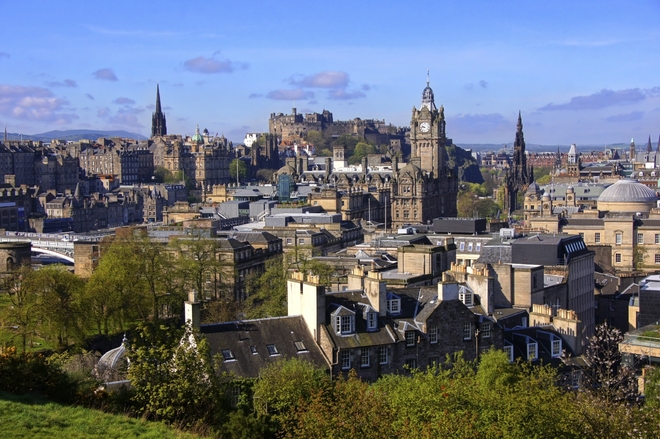Priyanka Singh
Sir Walter Scott was a celebrated writer, in Edinburgh, he is celebrated even more; like the eternal toast of the town. The buoyant Edinburgh Waverley (named after Scott’s Waverley series) train station is unlike anything you are likely to arrive at; the movement of people merely incidental. “The will to do, the soul to dare”, “In literature, as in love, courage is half the battle won”, “The best of luxury, the luxury of knowledge” — from every nook peer random quotes of the writer. Some make for a cheery floor pattern.
The nippy air carries the notes of distant bagpipes and sounds of ‘hey’. Seagulls. Festive, warm, cerebral, that’s the feel to the place. Curiosity is piqued. A sink-in couch, hot chocolate, Waverley novels come to mind. Must read, you make a mental note.
Born in Edinburgh (pronounced Edinbrah), Scott is apparently the favoured one. The over 60 m Gothic structure in the city, designed by a self-taught architect, is the largest monument ever dedicated to a writer anywhere in the world. With a spiral staircase comprising 287 agonising steps, it is for those with a good head for heights.
But it isn’t just about Scott. This idyllic city has much to offer, and it does, but at a languid pace. In spite of the bustling tourist-packed streets, there is an unmistakable quietude. Little wonder then that JK Rowling penned her first fantasy Harry Potter novel in a café in the serene environs that made for the perfect setting for the Hogwarts School of Witchcraft.
One does, however, wonder at the number of success stories that have emerged out of here and the association some superlative minds have had with Edinburgh University (among the oldest universities of the world) — Charles Darwin, writers Arthur Conan Doyle and Robert Louis Stevenson, Alexander Fleming (discovered penicillin), James Young Simpson (first to use chloroform as anaesthetic), Alexander Graham Bell (inventor of telephone), and to top it all, three Prime Ministers of the United Kingdom. Twenty Noble Laureates have an Edinburgh connect. That’s a lot to give out to the world. It’s no surprise it is also called “the Athens of the North”.
Among the many beautiful buildings, the Scottish Parliament sticks out like a sore thumb and for this alone, it is worth a look. Unimpressive on the outside, the façade resembles a wall plastered with giant hair dryers. What is wasted by the parliament building, the city makes up for by the Edinburgh Castle. As a vital stronghold, the imposing castle has seen tumultuous histories unfold over many centuries; and so is claimed to have been “the most besieged place in Great Britain and one of the most attacked in the world”.
Overlooking the verdant city, the menacing cannons on the castle grounds glisten in the tepid sun. Couple of yards away, is the sight of the annual Royal Edinburgh Military Tattoo (music performance by the British Armed Forces, Commonwealth and international bands). If you want to catch the tattoo and the Edinburgh Festival, August is the month you should be looking at to lace up your travel shoes.
The Scots do take their music seriously, as they do the scientific temper. The Dynamic Earth in the city is a 4D experience into the history of the Earth. Should you want to experience a simulated earthquake, or see a volcano go off, this is where you should head for.
Chivalry, they say, died with the legendary King Arthur. But his spirit lives on here. A longish trek will take you to King Arthur’s Seat atop an 822-ft hill — the site of an extinct volcano. It is here, the legend has it, he sat, contemplating a battlefield.
Equally famous was their queen — Mary, Queen of Scots. Her bathhouse is special because she would bathe only twice a year. Queen Elizabeth spends a week at Holyrood Palace, the residence of Scottish kings and queens through generations, every summer.
For all their unhurried pace and love of ease, the Scots are a proud race. And some do dream of breaking away from the UK. Why? “It’s about freedom,” explains a local. “We’ve fought many battles for our freedom.” A kilted Mel Gibson’s cry of “freedom” comes to mind. Braveheart.
“We have our oil wells, but we get oil from London.” Why not break free then? “The taxes would rise. Health bills will shoot. We can’t keep ourselves going,” he sighs. For now, freedom will have to wait, and the Scots understand that. In the meantime, they are rejoicing in what nature has to offer in plenitude.
A surprise, not pleasant, comes in the form of India Cross that commemorates the men of the 78th Highlanders who died during the “Indian Rebellion of 1857”. No hard feelings there. For us, too, it was only about freedom.
Unlock Exclusive Insights with The Tribune Premium
Take your experience further with Premium access.
Thought-provoking Opinions, Expert Analysis, In-depth Insights and other Member Only Benefits
Already a Member? Sign In Now










